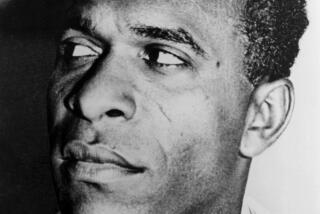A Troubling Consequence
- Share via
Regarding “Amistad” screenwriter David Franzoni’s Counterpunch (“Giving Credit Where It’s Due in ‘Amistad,’ ” Dec. 15), although I perceive his intentions to be good, I found some of his comments troubling. His giving credit “where credit is really due” to producer Debbie Allen at times sounded nearly identical with 19th century colonial ideas about race found in travel journals.
He writes that Allen led him to a vision of violence that embodies “with a single roar the timeless black American rage.” Is there a “timeless black American rage”? And why is this metaphysical rage the defining characteristic?
Then he writes that Allen, for his personal understanding, “reached down into the freezing Atlantic and from the muck and centuries resurrected . . . the thousands and thousands of African souls who had perhaps until this film been lying unheralded and even unknown in anonymous graves.”
First, how did Debbie do that?! Is it because as a black individual she is nevertheless representative of all black experience? Would a white person ever be bestowed with the same sweeping representativeness of all white experience? Second, “until this film” disturbs me; certainly, this film will reach a mass audience that other works cannot. And yet, is the education of the masses about racial matters once again because of the generosity of white liberal visionaries?
These sorts of constructions about race, the black race, as other, mysterious and homogenous, unfortunately echo the exact same attitudes that justified colonialism in many cases. I would hope people would question these attitudes.
SEANNA OAKLEY, Los Angeles
More to Read
Only good movies
Get the Indie Focus newsletter, Mark Olsen's weekly guide to the world of cinema.
You may occasionally receive promotional content from the Los Angeles Times.










